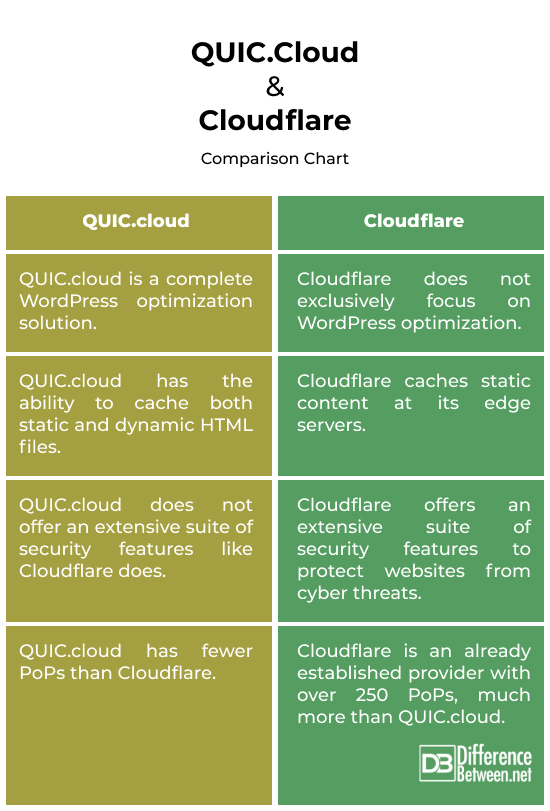Difference Between QUIC.cloud and Cloudflare
QUIC.cloud and Cloudflare are both leading CDN providers and optimization platforms designed to improve website loading speeds and reliability. Cloudflare is a comprehensive cloud security solution that provides a wide range of services, including DDoS protection, web optimization, and SSL encryption. Cloudflare is a widely used CDN and a global network that aims to improve the security and performance of everything connected to the internet. QUIC.cloud primarily focuses on WordPress optimization and is a relatively newer platform than Cloudflare. Let’s see how the two CDNs stand up to each other in this detailed QUIC.cloud vs. Cloudflare comparison. Let’s dive in!

QUIC.cloud
QUIC.cloud is a high-performance content delivery network and probably the only complete WordPress optimization solution. It is a platform geared toward WordPress and designed to accelerate website loading times. It employs QUIC and HTTP/3 protocols to enhance data transfer efficiency, reduce latency, and improve user experiences. The platform offers features like caching, image optimization, and security enhancements, all aimed at enhancing website speed and overall performance. One of its unique selling points is its ability to cache both static and dynamic HTML files.

Cloudflare
Cloudflare is one of the leading content delivery network (CDN) providers, with a vast and powerful network infrastructure. It is a web infrastructure company that offers an array of internet services that fall into various categories, such as application and network security, web performance, zero-trust security, and serverless platforms. It also offers DDoS protection, firewall, and security services to mitigate cyber threats and attacks. Additionally, it provides SSL/TLS encryption, load balancing, and DNS management to enhance website performance while protecting against online threats.
Difference between QUIC.cloud and Cloudflare
Content Delivery Network
– Both are reverse proxy CDN providers, but the biggest advantage Cloudflare has is its vast and powerful network infrastructure. Cloudflare is a comprehensive CDN that not only enhances website performance but also offers an array of security and optimization services. QUIC.cloud, however, utilizes QUIC and HTTP/3 protocols to make websites faster and more secure. It aims to reduce latency and improve content delivery by optimizing data transfer efficiency across its network of servers.
Static and Dynamic Caching
– Cloudflare offers caching as part of its CDN services. It caches static content on its edge servers, which means users can access cached content directly from the nearest server. This improves website speed and reduces the load on the origin server. QUIC.cloud, however, is the only CDN provider with the ability to cache both static and dynamic HTML files. It uses advanced caching mechanisms to store frequently accessed content closer to users. This reduces the need to fetch data from the origin server repeatedly.
WordPress Optimization
– QUIC.cloud is a complete WordPress optimization solution that makes websites faster with complete caching and advanced optimization features, including image optimization, lazy loading, and database optimization. These features are designed to enhance the performance of WordPress-powered sites. Cloudflare, on the other hand, does not exclusively focus on WordPress, but it does offer various performance enhancements for all types of websites. It optimizes images, serves content from its edge servers, and employs techniques like Rocket Loader to improve website speed and responsiveness.
Security
– QUIC.cloud primarily emphasizes website acceleration and optimization. Cloudflare, however, offers an extensive suite of security features, including DDoS protection, web application firewall, and SSL/TLS encryption, to safeguard websites from cyber threats and attacks. Cloudflare is a comprehensive security and performance solution that goes beyond just optimization. QUIC.cloud does not offer an extensive suite of security features like Cloudflare does.
QUIC.cloud vs. Cloudflare: Comparison Chart

Summary
Ultimately, the best choice between the two will depend on your specific needs and budget. If you are looking for a CDN with a generous pricing structure and DDoS protection, then QUIC.cloud is a good option. If you need a CDN with a broader range of services and features, including advanced security and optimization features, then Cloudflare is your best bet.
FAQs
Can I use QUIC.cloud and Cloudflare together?
QUIC.cloud offers a feature called “Cloudflare Integration” that makes it easy to set up QUIC.cloud with Cloudflare. QUIC.cloud will automatically configure your DNS to point to Cloudflare.
What is the difference between Cloudflare DNS and QUIC.cloud DNS?
Cloudflare DNS is a DNS resolution service that offers features like faster domain resolution, security measures, and privacy protections. QUIC.cloud DNS, on the other hand, refers to the DNS resolution service provided by QUIC.cloud specifically.
How do I use QUIC.cloud and Cloudflare?
To use QUIC.cloud, you typically need to integrate its optimization services into your website through its plugins or modules, depending on your CMS platform.
What is QUIC.cloud?
QUIC.cloud is a high-performance content delivery and optimization platform that utilizes QUIC and HTTP/3 protocols to accelerate website loading times. It offers caching, image optimization, and other optimization features to improve website speed and performance. It is a newer CDN than Cloudflare.
Why not to use Cloudflare?
Some potential concerns include overreliance on a single service provider, potential conflicts with existing server configurations, and the need to understand its settings to avoid misconfigurations.
What is the best alternative to Cloudflare?
Some potential alternatives to Cloudflare include Akamai, Fastly, StackPath, Amazon CloudFront, QUIC.cloud, and more.
- Difference Between Caucus and Primary - June 18, 2024
- Difference Between PPO and POS - May 30, 2024
- Difference Between RFID and NFC - May 28, 2024
Search DifferenceBetween.net :
Leave a Response
References :
[0]Lin, Geng and Lori A. MacVittie. Enterprise Architecture for Digital Business. California, US: O'Reilly Media, 2022. Print
[1]“QUIC.cloud vs Cloudflare: 2023 Definitive Guide.” Hatchet, hatchet.com.au/blog/quic-cloud-vs-cloudflare-2023-definitive-guide/. Accessed 14 Aug. 2023.
[2]“QUIC.cloud vs Cloudflare - 5 key differences.” Web Speed Tools, webspeedtools.com/quic-cloud-vs-cloudflare/#QUICcloud_vs_Cloudflare. Accessed 14 Aug. 2023.
[3]Image credit: https://www.canva.com/photos/MADBoVyVmnw-cloud-computing/
[4]Image credit: https://www.canva.com/photos/MAEJFH3h4qU-cloud-network-solution/
